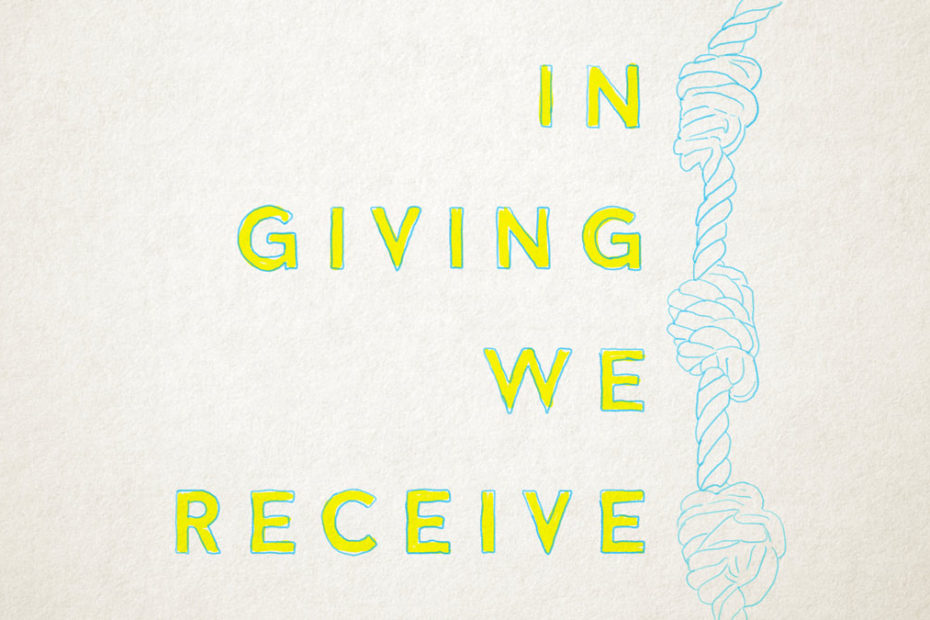We work hard in school so that we can get good grades. We get good grades so that we can get a good job. We get a good job so we can make lots of money. And so often we think that money will make us happy.
[wolf_button target=”blank” url=”http://twitter.com/home/?status=We get a good job so we can make lots of money. And so often we think that money will make us happy. – @KyleHeimann http://www.kyleheimann.com/generosity” color=”yellow” type=”flat” size=”big” target=”_blank” tagline=”–click to tweet this!–“]
We get a good job so we can make lots of money. And so often we think that money will make us happy.[/wolf_button]
Winning the lottery is often seen as one of the greatest things that can happen to a person. Regardless of the winner’s previous situation, he is instantly thrown into the arena of people who are supposedly always happy because they have everything they want.
However, studies have shown that people that win the lottery are more often less happy after having done so. It doesn’t make sense because we think that money will make us happy. However, that seems like proof of the statement, “Money can’t buy happiness.”
I had always subscribed to that way of thinking. But it wasn’t until I watched a talk about the effects of having money that I realized something a little deeper.
In this talk, a researcher, Michael Norton, was trying to figure out how money would affect our happiness. At first, I thought it seemed odd, but his studies and their results have changed the way I look at money. He came to the conclusion that money can buy happiness, it just depends on how we spend it.
Mr. Norton conducted many experiments where he would give people money and either ask them to spend that money on something for themselves or for another person. Then, he would compare their happiness before and after the experiment. Overwhelmingly, the people that spent the money on other people were happier, while the people that spent the money on themselves saw little difference.
In addition to this, he found that the amount of money didn’t change anything. It didn’t matter if they were given $5 or $20. It also didn’t matter what they used the money to buy (coffee, toy, food, etc.). The only difference that mattered was if they spent the money selfishly or generously.
So, it turns out, money can buy happiness, if it is used to do something generous. This reminded me of a particular Scripture passage:
For the love of money is the root of all evils, and some people in their desire for it have strayed from the faith and have pierced themselves with many pains” (1 Timothy 6:10).
In this reading, St. Paul is trying to warn Timothy about this false belief that money will bring people happiness. Instead, he suggests that it might cause pain. Now St. Paul isn’t saying that having money is a bad thing; he is saying that the love of money is a bad thing. It is not how much money that dictates whether it is good or bad, it is what we do with it that matters.
You might remember the poor widow that offered two small coins from the Gospels:
When he looked up he saw some wealthy people putting their offerings into the treasury and he noticed a poor widow putting in two small coins. He said, ‘truly, this poor widow put in more than all the rest; for those others have all made offerings from their surplus wealth, but she, from her poverty, has offered her whole livelihood’” (Luke 21:1-4, Mark 12:41-44).
The difference between the widow and the wealthy people was not the amount of money that they had, but rather the amount of generosity they had. The poor widow did not give out of her surplus, but out of sacrifice. It reminds me of the generosity I found in Mexico (read that blog).
I struggle often with the desire to make more money or buy more things, and I have to remind myself that God is calling us, first and foremost, to be generous — generous with our time, our talents, and our money. Tithing is one of the ways that we are called to give generously. We are all called to be like the poor widow whether we have millions in the bank or pennies. It isn’t about the amount; it is about our generosity.
And by doing the will of God, we will have a reward in heaven, but it seems like we might also be happier on earth.
[wolf_button target=”blank” url=”http://twitter.com/home/?status=The secret to buying happiness is actually a 2000 year-old concept. – @KyleHeimann http://www.kyleheimann.com/generosity” color=”yellow” type=”flat” size=”big” target=”_blank” tagline=”–click to tweet this!–“]
The secret to buying happiness is actually a 2000 year-old concept.[/wolf_button]
Use this image I made as your desktop background as a reminder:
>The original video:

